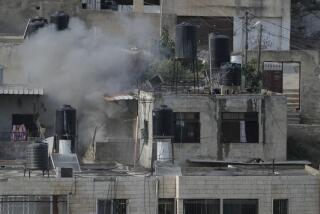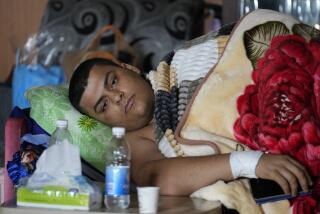Bodies of 14 Iraqi police officers found after threat
- Share via
BAGHDAD — The bodies of 14 missing police officers were found near a school in Diyala province Friday after a group linked to Al Qaeda claimed to have kidnapped members of a government security force in retribution for the alleged rape of a Sunni Arab woman.
Police confirmed that the 14 men, members of a rapid-response unit, were found shot through the head with their hands tied behind their backs.
They disappeared Thursday on their way home on leave to the Shiite town of Khalis, police said. Because Sunni insurgents regularly target members of the Shiite-dominated security forces in the province, the men had taken pains to travel inconspicuously, wearing civilian clothes and riding in sedans.
It was unclear whether the officers were among the 18 blindfolded men pictured earlier on a website by a group calling itself the Islamic State in Iraq. Those men were standing and kneeling in rows with their hands tied behind their backs. Some were in civilian clothes, others in combat fatigues, and at least one wore the insignia of an Iraqi officer.
At least three Diyala officers, who said they were relatives and neighbors of the slain men, could not identify any of the people shown on the website, said Maj. Raul Marquez, a U.S. military spokesman in Baqubah, the capital of Diyala province.
“The quality of the photo was low, so it is very difficult to pull out details,” Marquez said by e-mail.
A statement on the site claimed the men were seized in Diyala, but it did not specify when.
“This blessed operation is a response to the crimes committed by those infidels in their fight against the Sunnis,” the statement said. “The latest crime committed by these treacherous institutions was to rape our sister Sabreen.”
The group threatened to kill the men within 24 hours if the government did not hand over the responsible officers and release all Sunni women in Interior Ministry prisons.
A second statement said that the government had failed to respond to the group’s demands and that its court had “ordered God’s verdict applied.”
Brig. Gen. Abdul Karim Khalaf, a spokesman for the Interior Ministry, said the government did not negotiate with hostage-takers. He cast doubt on the group’s claims.
“We can’t trust the Internet sites, and those pictures might not be authentic,” he said. “Anyone can make a website and put any claim they want on it.”
Last week, a 20-year-old woman who called herself Sabreen alleged in a television interview that she had been raped by three Shiite officers.
The woman’s tearful claims sparked outrage. Prime Minister Nouri Maliki, who has promised an evenhanded effort to quell the nation’s sectarian fighting, ordered an investigation. But within 24 hours, the Shiite premier had rejected the allegations, labeling the woman a liar and insurgent collaborator wanted by the authorities.
The government’s handling of the case heightened sectarian tensions and deepened Sunnis’ mistrust of the security forces, which authorities acknowledge have been infiltrated by Shiite militias. A second Sunni woman later emerged claiming that soldiers raped her during a raid of her home in the city of Tall Afar.
In a third statement posted Friday, the Islamic State of Iraq group declared it was launching an “honor revenge” campaign and threatened to kill 2,000 police and militiamen “for each sister that was violated.”
The grisly find in Diyala province underscored fears that as U.S. and Iraqi forces focus their attention on Baghdad, violence could escalate elsewhere.
The troubled capital has seen an apparent dip in the execution-style killings that are the hallmark of Shiite death squads since thousands of extra troops started pouring into the streets last month. But the stream of bombings typically associated with Sunni insurgents has continued.
At least four bombs exploded in and around Baghdad on Friday, killing 13 Iraqis and injuring dozens. Two U.S. soldiers and an interpreter were also reported killed and another soldier injured in one of the blasts.
One of the bombs exploded in an area of used-car dealerships on the edge of Sadr City, a vast, mostly Shiite district of east Baghdad and a stronghold of the powerful Al Mahdi militia loyal to radical anti-American cleric Muqtada Sadr. The blast killed 10 people and injured 17, police said.
U.S. and Iraqi officials, wary of previous confrontations with Al Mahdi militiamen, have avoided major operations in Sadr City, fueling Sunni distrust of the security clampdown that began Feb. 13. But they have said they are nearing agreement with community leaders on plans to establish a permanent presence in the district.
Brig. Gen. Joseph Anderson, chief of staff of Multinational Corps-Iraq, said he expected construction to begin on a joint U.S.-Iraqi security station in Sadr City in the next week.
“That will be the initial footprint, if you will, in Sadr City to begin further operations before increased patrols and those type of things occur, all within a month for sure,” Anderson told journalists at the Pentagon by video link from Iraq.
A car bomb targeted a police patrol in a religiously mixed district of southwest Baghdad, killing one officer and injuring three, police said.
South of the capital, a roadside bomb killed two civilians and injured 10 in Sunni-dominated Latifiya, police said.
The two U.S. soldiers and interpreter who died were the victims of an explosive device detonated during a road-clearing patrol northwest of the capital, the military said. At least 3,166 U.S. personnel have been killed since the start of the Iraq war in 2003, according to the website icasualties.org, which tracks military casualties.
Police recovered at least five bodies in Baghdad, apparent victims of sectarian death squads. Another body was found shot execution-style in Iskandariya, south of the capital, police said.
Times staff writers Mohammed Rasheed, Saif Hameed and Saif Rasheed in Baghdad and special correspondents in Baghdad and Babil contributed to this report.
More to Read
Sign up for Essential California
The most important California stories and recommendations in your inbox every morning.
You may occasionally receive promotional content from the Los Angeles Times.













